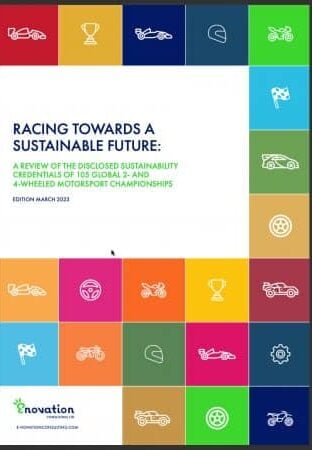Off-Road racing is often not looked at as closely when it comes to sustainable motorsport initiatives but some of the most innovative solutions can be found in this form of motorsport.
This week in the Sustainable Motorsport Roundup I look at what is happening in Extreme E and the Dakar and how alternative fuels, and technologies are making their presence felt.
In addition to that there is a closer look at IndyCar’s sustainability initiatives, the release of the 2023 edition of the Sustainable Motorsport Index and how Lando Norris’ dad wants to green the paddock.
I also bring back my occasional columns Every Little Bit Counts, The Big Picture and Getting to the Track Sustainably for a macro view of sustainability.
All this and more in this week’s edition of the Sustainable Motorsport Roundup on Motorsport Prospects. Its green news racers can use.
Sustainable Motorsport News

The 2023 edition of the Sustainable Motorsport Index has been released.
The Sustainable Motorsport Index™ is the only global performance system assessing Motorsport stakeholders’ sustainability against the United Nations’ Sustainable Development Goals (SDGs) and the Environmental Social and Governance (ESG) framework. We use carefully calibrated indicators to provide comprehensive and balanced comparison across five broad areas: environment, social, governance, sustainability approach and engagement, international and industry specific accreditations and awards.
The findings in this year’s Sustainable Championships Index report confirm that momentum is growing year on year. Leading the pack are the ABB FIA Formula E Championship and FIA Formula One World Championship in first and second position respectively, maintaining their positions from the inaugural ranking in 2022. The FIM World Championship Grand Prix (Moto GP) ties with Extreme E in third place, with the latter having moved up from fourth place since last year. All four leading championships improved their scores since this paper’s first edition.
2023 Sustainable Motorsport Index
Here are some highlights of the Racing Towards EV panel that was part of last September’s Sustainability LIVE London, hosted from the BDC, London on 7-8th September 2022. Featuring Hannah Brown, Chief of Staff for Formula E, and Miguel Valldecabres Polop, CEO of EV Dynamics. “The panel covered some really interesting subjects from the world of electric vehicles (EVs), lifting the bonnet on innovations and challenges facing the industry from the perspective of those working within. Here are the highlights of the discussion, led by BizClik Media’s Chief Content Officer, Scott Birch.”
You can read the highlights here.

The father of McLaren Formula 1 star Lando Norris believes his new range of electric scooters can benefit racing paddocks around the world, by helping teams stay mobile without polluting the planet.
“We’ve just had an order for 20 from one Le Mans team, and 10 from another,” he said. “I look back on the days with Lando in paddocks from karting all the way through to F1, and they were such good fun times, with great people. But getting around a big space like Silverstone as a competitor can feel like a nightmare sometimes, when the pits can be half a mile away from your paddock. When Lando did the Daytona 24 Hours, we were travelling miles from the car park to the pit lane or RV or wherever. What it’s great is that you can fold our product up, put it in the back of your car, arrive at the track, get to the race truck, go to signing-on, scrutineering, drivers’ briefing – all of that – it’s such an easy way to get around the paddock.”
Sustainable Motorsport Tech
Jaap Bolk plans to participate in the Dakar Classic while achieving an environmentally friendly milestone. He recently acquired a Mitsubishi Pajero Evolution that he will modify for the 2024 edition to, as he wrote on social media, “reach the finish co2 neutral.”
“Interest in “greener” fuel sources has grown in both consumer and racing circles, and rally raid is no exception with Dakar competitors like the electric Audi RS Q e-tron E2, GCK Motorsport’s upcoming hydrogen-based e-Blast H2, and the hydrogen/diesel-powered KH-7 Epsilon truck. In contrast to these, Bolk argues bioethanol is a more practical option especially for smaller teams hoping to make the switch due to its compatibility with combustion engines and easier storage and maintenance. Bolk’s prior experience with it also allowed his team to address concerns like lower energy density than diesel and petrol, the risk of corrosion, and poorer performance in cold weather.”
Extreme E is becoming a great proving ground for sustainable motorsport technology and here are two examples.
Off track, Extreme E delivered a successful first test of a new and innovative mobile fuel cell system provided by ENOWA, the championship’s Green Hydrogen Power Partner. The fuel cell system, provided by ENOWA in collaboration with Energys, is a cutting-edge, low-zero carbon, off-grid energy technology, delivering a reliable hydrogen-based power solution for remote sites. Based on technical specifications developed by ENOWA, the unique system is one of the world’s largest commercial operating fuel cells, with ‘first of its kind’ combined functions.
According to a release by Extreme E, partner Zenobē will be back for season three and its “powerskids” will play a pivotal role in powering the remote microgrids required to support the teams, their EVs, and the overall league operations like broadcasting. The powerskids are powered by repurposed electric bus batteries with the capability to store roughly 150 kWh of energy, replenished by ENOWA’s hydrogen fuel cells, in addition to solar and wind energy. Extreme E explains that Zenobē’s powerskids alone help it avoid approximately 15 tons of CO2 emissions each year.
Composite World looks at the growing use of natural fibers in applications like motorsport.
“Despite the sustainability appeal of a plant-based, renewable alternative to carbon or glass fiber, commercial adoption of natural fibers in composites has been relatively slow, due to industry challenges such as limited supply, variable fiber quality, limited mechanical performance in finished parts, differences in manufacturability and, depending on the material, higher material costs compared to fiberglass. These materials are growing in appeal not just because they come from a renewable source, but because of technical advantages in composites like lightweighting and vibration and noise damping, as well as aesthetic appeal.”
Series News

In the video above, Julia Pallé, Sustainability Director at Formula E discusses overtaking climate change through electrification.
Damien Smith in Motorsport Magazine looks at the enigma that is Formula E in Formula E now has better racing than F1, but will anyone notice? “What a shame, then, that so few people – at least in stark contrast to the multi-millions that follow F1 – will even care to notice. Perhaps for the first time, I feel confident enough to say they’re all actually missing something. Formula E, finally, is coming of age.”
Carbon Positive Motorsport will be working in partnership with the Junior Rallycross Championship for 2023. Steve Smith, Carbon Positive Motorsport founder, commented, ” I’ve personally known the Gwynne family for over 35 years and I am very excited to announce that we have secured a partnership with the Junior Rallycross Championship headed up by Peter Gwynne & Sarah Watson.”
You can find out more about Carbon Positive Motorsport in my interview with CPM founder Paul Glass here.
In this article in Forbes on Camaro ceasing production in 2024 and how it will affect their participation in NASCAR, it touches on NASCAR’s potential electrification plans. “NASCAR is well aware that the auto industry is moving towards full electrification. The bridge to that will probably be hybrid, a mix of electric and ICE, and the sport did design its Next Gen car with that in mind. There has also been talk of an all-electric companion series for the future, not unlike the FIA’s Formula E series is to Formula 1.”

The Sustainable Championships Index has featured the Goodyear FIA ETRC in a notable mention. “The Goodyear FIA ETRC was ranked 16th overall out of 105 globally recognised 2- and 4-wheeled motorsport championships, acknowledging the efforts of the series to reach net-zero by 2038 and utilising its platform to drive change in the haulage industry. The plans and actions of the championship to reach carbon neutrality in the next decade have been set out in the sustainability roadmap in 2021. The Goodyear FIA ETRC was the first-ever motorsport series to successfully switch to a 100% sustainable fuel and bio-LNG and with title partner Goodyear, the racing tyres are recycled for on-road retreading, further reducing the use of natural resources, waste accumulation and energy.”
Things are not going well for the Electric Touring Car Championship (ETCR) as it prepares for its 2023 season. Discovery Sports Events has announced that they are withdrawing from their role as 2023 ETCR promoter. The FIA has expressed their ‘disappointment’ at the Discovery decision while current competitors are expressing hope the series will continue. Romeo Ferraris General Manager Michele Cerruti says she feels ‘there is a future’ for the ETCR eTouring Car World Cup while Cupra’s Motorsport Director Xavi Serra hopes that the ETCR will return ‘stronger’ after the announcement.
Blackbook Motorsport goes inside the deal of how IndyCar is working with Shell and Firestone to fuel its sustainability drive. “In collaboration with its partner Shell, the US-based open-wheel racing series has introduced 100 per cent renewable fuels for this year, becoming one of the first major motorsport properties to do so. IndyCar has also worked with long-time partner Firestone to roll out a sustainable tyre constructed from guayule, a product derived from a desert shrub.”
Every Little Bit Counts
Every Little Bit Counts looks at small steps that you can take to decrease your environmental impact and increase your sustainability.
Following a Scandinavian test run last year, the Lufthansa Group has launched its ‘Green Fares’ offering by all its six airlines on more than 730,000 flights per year within Europe and North African destinations Morocco, Algeria and Tunisia. Under its “more climate-friendly pledge”, the fares have already built in the extra cost of offsetting all flight-related CO2 emissions, with 20% of the contribution being used to purchase sustainable aviation fuel and the remainder in “high quality” climate protection offsets. The Green Fares can be booked “with just one click” via the airlines’ websites as well as the NDC platform in Economy and Business classes. The Group has also signed an MoU with VARO Energy on the production and supply SAF, deliveries of which could possibly start as early as from 2026. It also revealed more than 20 Boeing 777-300ER long-haul aircraft will be equipped with film modelled on the microscopic structure of shark skin that collectively will reduce the Group’s CO2 footprint by over 25,000 tonnes annually.
Commons is a mobile app available for iOS and Android that allows you to track the emissions of your purchases and receive personalized tips and insights. You can get more information here.
The Big Picture
In The Big Picture, I look beyond motorsport to see what other sports are doing in their sustainability journey as well as the issue of sustainability generally. Hopefully this will act as a catalyst for change in the motorsport ecosystem as it demonstrates that in many ways, all sport shares some commonalities that can be tackled with achievable, measurable sustainability practices.

You can now listen to the SXSW session Sports for Climate Impact: How our Industry Can Be Part of the Solution. “The live sports industry has a significant impact on the environment, from the energy consumed during events, to the waste generated by fans, to the logistics of getting everyone and everything to the buildings. However, many sports organizations are taking steps to become more sustainable and reduce their environmental impact. In this panel discussion, we will hear from experts in the field of sustainable sports initiatives and learn about the innovative approaches being taken to drive positive impact. The panelists will share their experiences and insights into the challenges and opportunities of sustainability in sports, and discuss ways in which the industry can work together to drive positive change.”
The Unofficial Partner Podcast had an interesting episode discussing Coke and the Olympics with former VP James Williams. As part of that conversation, Shaun Whatling, co-host on The Buy Side series starts a list of what he feels should be priorities for any Olympic Partner Program (TOP) and it could very easily be applied to any large international sports federation like the FIA.
The first is actually lowest risk. It’s no more than what is required of any sustainability strategy (for the time being) – a plan for measured and achievable progress. And here are some starters for ten:
- a transparent, published and live commitment to sustainability specifically minimising their own carbon footprint which tracks against the frameworks established by the Paris Agreement
- less than 30% of the Partner’s core business to come from the top 5 high polluting industry categories, unless it can demonstrate clear commitment to reducing carbon emissions in advance of the Paris framework
- no egregious examples of greenwashing in last five years
- upper quartile ESG ranking within its category
- acceptance of an IOC framework for partner activity such as :
Sport’s Leadership Crisis?
- a plan to monitor and reduce TOP carbon impact at each Games in line with the Paris Agreement (or better)
- caps for long-haul hospitality invitations
- allocating Games tickets according to geographic bands to reduce travel
- commitment to the public transport options of the Organising Committee for 90% of guest and employee travel
You can listen to the podcast here and read about the TOP proposals here.
Getting to the Track Sustainably
Getting to the Track Sustainably is my occasional column on developments in sustainable transportation that could have some application to motorsport. Since most carbon emissions come from logistics and transportation, this topic is of utmost importance as motorsport works to make itself more sustainable. Here are some articles you may find of interest.
Sustainable Transport and Logistics

In the second installment of HSBC’s Transition Pathways, they’re focusing on the transport sector and taking a look at business sentiment across the air, maritime, road (freight and services), rail and the logistics verticals of the industry. Whilst the sector was affected by the COVID-19 pandemic, emissions and demand have returned, especially in emerging markets. Despite the challenges, momentum is building with many businesses in the sector seeing net zero as crucial to commercial growth, driving action to decarbonise their Scope 1 and 2 emissions and embedding new technologies related to electrification and sustainable fuels in their operations and value chains.
A “mind-blowing” discovery in the early stages of photosynthesis has been discovered by scientists that could help improve the efficiency of renewable energy technologies. “While trying to figure out if it were possible to extract electrons from a known process in the early stages of photosynthesis, the scientists instead found an entirely-new electron transfer pathway, which for those who remember their biology 101, is the metabolic method that extracts the most energy from food.”
An online workshop organised by ZERO explored the importance of the EU Emissions Trading System in addressing the negative environmental impacts of air travel and maritime transport. Daniele Rao from Carbon Market Watch looked into the aviation industry and its path to climate neutrality, attempting to gauge if voluntary climate action by major airlines constitutes a case of greenwashing. Nora Wissner from the Öko Institute presented a study on the inclusion of shipping in the EU’s Emissions Trading System (EU ETS).
Sustainable Land Transportation
- Lamborghini Revuelto: the first super sports V12 hybrid HPEV
- F1 veterans join Verge Motorcycles to develop e-motorbikes
- E-fuels u-turn: EU allows combustion cars to be sold after 2035
- Europe Looks To Allow Synthetic Fuels For Cars After All
- Germany has successfully watered down a planned EU ban on the sale of combustion-engine cars
- Nissan Announces A New Electric R32 Skyline GT-R
- Who buys electric cars in California?
- Troubles Loom If Europeans Are Denied Cheap Electric Cars
- Volkswagen releases concept for affordable electric vehicle
- 7-Eleven Offers Up Slurpees, Big Bites—And EV Charging Stations
- How Many EV Charging Stations Are There in the US?
- Top 10 best-selling electric vehicles in the US
- Audi CEO Is Focused On Fully-Electric Future And U.S. Production Timeline
- Volkswagen Commits To $131 Billion In EV And Digital Development By 2028
- VW And GM Are Passing Tesla In The Race To Sell Affordable EVs
- ‘Competitive advantages’ | Finland wants green hydrogen-based e-fuels to make up 3% of all transport fuels by 2030
- Self-Driving Systems Are a Moral Maze. We Asked an Expert if They’ll Ever Be Safe
- A Cool, Affordable EV Is Coming. Just Not to America.
- Bertone’s Comeback Supercar Produces 1,100 HP With Trash-Based Fuel
- The 2025 Alfa Romeo Giulia Quadrifoglio will be a fully electric 1,000bhp super-saloon
- German government approves sale of 100% synthetic fuels
- The States With the Most (and Fewest) EV Charging Stations
- Fiat 500e: The small but mighty choice for European drivers
- Porsche’s Next Electrics? A Jumbo SUV and 718 Sports Car, Coming Mid-Decade
- Why Hybrid Cars Still Matter
- Volkswagen to invest $193 billion over 5 years to hit EV target
- Rivian Wants Out of Exclusive Amazon Electric Van Deal: Report
- The Hummer EV Is Huge, Heavy, Ostentatious, and a Lot of Fun
- The Future May Be Rosy, But For Now, J.D. Power Says EV Owners Are Less Happy With Service Experience
- Is Lamborghini Betting on Hybrid Electric Performance?
- Mack’s Electric Truck Could Be a Fleet Game-Changer
- Maserati’s Electric GranTurismo Folgore Is Really Complicated—And Really Fun
- Aston Martin’s First All-Electric Car Is Coming in 2025
- How Norway Can Help Cure America’s “Range Anxiety”
Sustainable Aviation
- Watch The First All-Electric Commuter Airplane Hit The Skies In First Test Flight
- JetBlue and Shell Aviation sign SAF agreement
- Private jet pollution in Europe has skyrocketed 855% since the pandemic
- Hydrogen fuel could change the way aircraft work, and look
- Neste in SAF deals with Wizz Air and Boeing, and supplies first 100% SAF helicopter flight
- Heathrow offers airlines £38m to support greater use of SAF as government consults on 2040 zero-emission target for airports
- United Airlines launches $100 million fund dedicated to sustainable aviation fuel investment
- Delta’s first carbon neutral flight powered by Air BP-supplied biofuel
- Delta to drive SAF usage in pursuit of net-zero goals
- LATAM flight uses SAF for first time
- This weird-looking plane could someday be a fast, clean option for air travel
- This Bonkers 1,000 HP Flying Supercar Soars Like a Jet and Looks Like a Bugatti
- Will Supersonic Flying Actually Take Off? These Companies Think So.
- These electric driverless baggage vehicles are now whizzing around one of the world’s best airports
- Air bp makes first sale of SAF from its Spanish refinery
- Old-School Winglets Are Getting a Second Life Helping Modern Jets Fly More Efficiently
- Private Aviation Has Pledged to Reach Zero Carbon Emissions by 2050. Here’s How That Can Happen.






